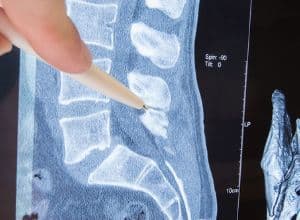We often see patients who come to the clinic for immediate treatment for pinched nerve, saying they feel they have a pinched nerve or have been diagnosed with it. A pinched nerve could show itself through many symptoms. In each case, there’s something wrong, and the nerve is irritated, compressed from inflammation, or pinched by the vertebrae.
What is a Pinched Nerve?
A pinched nerve is due to too much pressure being applied to a nerve. This pressure could come from muscles, bones, tendons, or cartilage and disrupts the nerve’s ability to function. This causes various symptoms, including pain, numbness, tingling, and weakness.
A pinched nerve could occur anywhere along the spine (cervical spine = neck, thoracic spine = upper to mid-back, lumbar spine = lower back) and any joint throughout the body.
A herniated disc can pressure the nerve root in the spine, causing pain and discomfort. In the wrist, it could cause a condition known as carpal tunnel syndrome.

Pinched Nerve Symptoms
- Pain though out the spine
- Intense migraines or headaches
- Pain going down the arm or leg
- Numbness, burning, tingling, sensation in the arms, legs, or even in the fingers and toes
- Low Back Pain
- Neck Pain
A pinched nerve could make someone less mobile; it may also cause them to have trouble sitting for a long time and then have trouble standing from being in that position. A pinched nerve could also cause someone to have problems bending and sleeping in certain ways.
It could likewise cause muscle spasms on top of pain. Because the nerves control the body by transmitting signals to the internal organs and muscles when a person has a pinched nerve, their body can’t communicate and heal itself; this could lead to other health problems.
You might wonder, “So, how did I get a pinched nerve?” Well, there are a couple of possible reasons.
Subluxation or Misalignment
A subluxation is a spinal bone (vertebra) misalignment that compresses a nerve. That causes that nerve to be unable to complete the body’s communication process – leading to other health problems.
Disc Degeneration
There is small cartilage between each vertebra; these are known as “discs.” Sometimes the disc starts to degenerate due to stress. When a disc begins to degenerate, the small space a nerve has to threat through is made even smaller, leading to a pinched nerve.
Osteoarthritis
Osteoarthritis is more known as degenerative joint disease. Osteoarthritis could cause bone spurs to grow, which could cover the small hole the nerve already has to go through, and like disc degeneration, causes your nerve to be pinched.
Disc Protrusions or Herniation
Numbness, tingling, shooting, and sharp pain down the arm or leg indicate a disc herniation or protrusion. When a disc herniation and protrusion occur, the disc material pushes against the nerve. In the neck, the nerves travel into the hands, and in the lower back, they travel down to the feet. That’s typically referred to as a pinched nerve.

It’s important to understand that these four basic causes of a pinched nerve are typically silent during the early stages of progression. Many individuals have no symptoms during the early stages, so it’s important to regularly visit your chiropractor to determine your spine’s health and immediate treatment for pinched nerve.
Pinched nerves could result from any combination of these; they can even all happen simultaneously.
5 Reasons Chiropractic Is the Best Treatment for Pinched Nerve Pain
If you’re experiencing a pinched nerve, you might be wondering who to turn to for treatment for pinched nerve—one of those options is a chiropractor. Where pinched nerves are concerned, chiropractic treatment is the best option to alleviate pain and prevent future problems.
Chiropractors Are Experts In Pinched Nerves
While chiropractors study your spine, they spend much of their education learning about its impact on your nervous system. Chiropractic’s underlying philosophy is that the body operates holistically, with the spine controlling the nervous system that sends messages to the rest of the body. When adjustments are conducted, the goal is to remove nerve interference in the body, causing health issues and stopping your body from performing optimally. That means that chiropractors understand the nervous system very well.
If you are presenting symptoms of a pinched nerve, a chiropractor could make an accurate diagnosis via a discussion of your history and symptoms and a physical evaluation. That will allow them to determine what nerves might be impacted and what parts of the spine could be adjusted to help relieve your pain.
Chiropractic Addresses The Main Causes Of Pain

When people are experiencing pain, they tend to want relief quickly. That can be true for pinched nerve pain, and you might be tempted to seek treatment for pinched nerve through pain medication. While this can help you cope in the short term, pain medication masks your symptoms without dealing with the root cause. Your nerve would continue to pinched, and the condition could worsen over time, leading to more pain or serious problems.
Chiropractic treatment for pinched nerve identifies the impacted nerve and utilizes spinal manipulation to remove the compression, relieving symptoms and the injury or issue. A bone, joint, or muscle is the culprit for pinched nerve pain when they get misaligned or moved from their natural position. A chiropractor can conduct an adjustment that returns these structures to their proper position, relieving the pressure on the nerve for urgent treatment for pinched nerve and risk reduction.
Chiropractors Could Do More Than Adjustments
While chiropractic care and adjustments are the main treatment for pinched nerve, chiropractors can use various treatment methods as needed. They would often incorporate aspects of physical therapy to strengthen any affected muscles. You may be asked to proceed with gentle exercises at home and your treatment for pinched nerve in the office.
Depending on the reason for the injury, you may also be advised on lifestyle changes such as diet or exercise that could help speed up the healing process.
Chiropractic Care Is Preventative
Aside from ridding you of your immediate pain, a chiropractor would also be focused on preventing similar injuries from happening in the future. That may involve strategies to incorporate into daily life.
Many pinched nerves result from poor posture and jobs requiring us to sit at desks in front of a screen for longer periods. Chiropractors could help create a plan to improve your posture, incorporate movement into your day, or change your office setup and positioning.

If you had an injury that resulted in pinched nerve pain, chiropractors would look for ways in which your body is vulnerable. For instance, pinched nerves can sometimes happen when a joint is dislocated, and these injuries become more likely to happen after a first occurrence. Chiropractors may work to strengthen joints and create plans to avoid future injuries that could result in pinched nerves.
Chiropractors Can Rule Out Serious Injuries
In most instances, the cause of a pinched nerve has to do with misalignments and is straightforward to deal with. However, there are cases where the signs of a pinched nerve may result from something more concerning, or the injury might have progressed to needing more invasive care. During your evaluation, the chiropractor would be able to identify when a pinched nerve is worse than it looks and refer you to the proper specialists to avoid issues in the future.
Why Chiropractic Care for Pinched Nerves?
Chiropractic care is a natural, healthy, and conservative approach to allowing your body to heal. With chiropractic, you wouldn’t be put through unnecessary surgeries or on harmful treatment for pinched nerve. Through gentle adjustments, chiropractic lets your body do its job. Your body wants to heal itself; you have to let it.
FAQ
What is the best treatment for pinched nerve in neck?
The most frequently advised treatment for pinched nerve in the neck is for the patient to rest the affected area. Your physician will ask you to avoid any activities that aggravate the compression. Depending on the severity and location of the pinched nerve, you may need a splint, collar, or brace to immobilize the area.
What is the medication for a pinched nerve?
Nonsteroidal anti-inflammatory drugs can help relieve pain. Anticonvulsants, such as gabapentin, and tricyclic medications such as nortriptyline and amitriptyline, are also often used to treat nerve-related pain.
Who treats trapped nerves?
Chiropractors specialize in minimizing that stress to treat pinched nerves as well as prevent them from happening.
